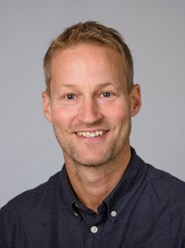
I am a professor of organic chemistry and my research group looks for new solutions for infectious and neurodegenerative diseases. I am director of the Umeå Center for Microbial Research, UCMR.
The research interests in Fredrik Almqvist’s (FA) lab focus on method developments in organic synthesis and design and synthesis of molecules that interact with macromolecules, in particular inhibition of protein-protein interactions. Examples of the latter involve development of inhibitors of bacterial macromolecular assembly and amyloid formation. The FA lab has pioneered the design and synthesis of ring-fused 2-pyridone compounds as peptidomimetics and together with Dr. Hultgren’s lab at Washington University in St. Louis they have shown that these mimetics are ideal for the development of antivirulence compounds. FA has developed small molecules called “pilicides” that inhibit chaperone-usher pathway (CUP) pili, which are important virulence factors of uropathogenic E. coli (UPEC) and this has resulted in a deeper understanding of regulation of CUP pili biosynthesis and the ability of UPEC to establish biofilm formation. In addition, together with Dr. Chapman at the University of Michigan FA have further studied a subset of the pilicides called “curlicides” that dependent upon the substitution pattern on the central fragment have the ability to affect curli assembly in E. coli. These compounds are excellent tools in the strive for a greater understanding of the mechanisms behind amyloid assembly in general but curli assembly in particular. Both pili and curli are important constituents in different bacterial biofilms and the group has a general interest in developing biofilm inhibitors. In this context FA started a few years ago a collaboration with Dr. Christina Stallings at Washington University in St. Louis to develop their discovery of mycobaterial tolerance inhibitors (MTIs) and investigate and understand the exact mode of action of the MTIs. These new compounds have great potential to improve treatment regimens for Tuberculosis, the deadliest infectious disese in the world. The wide range of inhibitors that have been developed in the lab has led to several cross disciplinary collaborations and among these FA has ongoing research with UCMR researchers Dr. Sven Bergström and Åsa Gylfe (Chlamydia), Jörgen Johansson and Elisabeth Sauer-Eriksson (Listeria) and Johan Normark (Tuberculosis) with the aim to improve efficacy and disect exact mode of action.